★★½
“Doesn’t live up to the blurb on the back. Then again, how could it?”
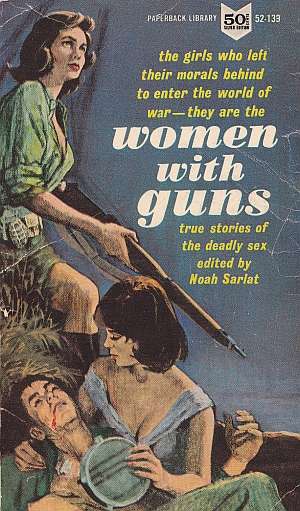 The tender sex – and the terrible things they can do. Violence, savagery, sudden death on the battle field, torture and butchery behind enemy lines – these are the facts of war. It is a man’s world… but what of the women trapped in it? What of women such as:
The tender sex – and the terrible things they can do. Violence, savagery, sudden death on the battle field, torture and butchery behind enemy lines – these are the facts of war. It is a man’s world… but what of the women trapped in it? What of women such as:
- Minerva, the sexton’s sexy daughter, who loaned her secret weapon to the Danish underground…
- Repon Sirik, young leader of Indochina’s feared Hoa Hoa, women warriors who’ve made life a living hell for their enemies…
- Tuli, the Laotian lady with a yen for vengeance and a wild way with jungle warfare…
- Frau Kastanie, the not-so-merry widow and her party-girl panzers of Bremen…
- Katina, her four Greek girl friends, and their crazy, blood-spattered flight to Istanbul…
These are the women with guns, stripped of morals, fighting and loving in the savagery of war. You’ll meet them (and others) in these strange but true accounts.
That’s the lurid copy on the back of this fifty-cent 1962 pulp collection of stories, originally published in magazines with names like For Men Only or Male. The reality is rather different: without exception, the characters mentioned are supporting at best, and nearer cameos in a couple of cases. The stories are very much male-oriented: for example, the head of the Danish underground, and the man who leads Katina et al out of Nazi territory. It’s through their eyes that events unfold, and they’re responsible for most of the action. There are occasional moments otherwise – but in that area, I note it’s the “foreign” i.e. non-white women, who are easily the most pro-active. Civilized girls just don’t do that sort of thing.
This doesn’t mean that the stories are bad: the majority are solid, two-fisted pieces of entertainment, obviously products of their era (sex is fairly frequent, yet largely happens off-page, after a knowing ellipsis), yet rarely dull. The sole exception is Hitler’s Hustlers of Bremen, a muddled, confusing and, frankly, dull piece about black-market shenanigans in Germany just after the war. My favorite, on the other hand, was Five Greek Girls to Istanbul – basically, the title is close to the plot there, with the hero leading his mini-harem through occupied territory, with a sojourn as members of the resistance on the way. Still, I can’t hide a sense of disappointment, even if such mis-direction is a concept with which I’m certainly familiar: many are the 21st century DVDs with equally lurid cover and blurb, that similarly fail to deliver.
Editor: Noah Sarlat
Written by: Richard Gallagher, Emile C. Schurmache, George Mandel, James Collier, Burton Shean





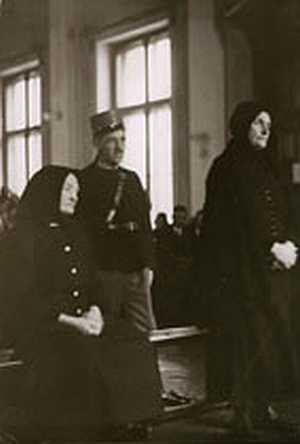 You wouldn’t know it to look at the sleepy Hungarian village of Nagyrév [population: 872], but there was a time between the world wars when this was the murder capital of the world. Between 1914 and 1929, an estimated
You wouldn’t know it to look at the sleepy Hungarian village of Nagyrév [population: 872], but there was a time between the world wars when this was the murder capital of the world. Between 1914 and 1929, an estimated 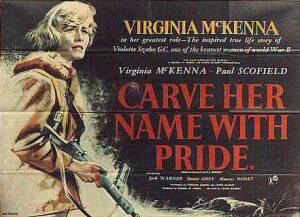 This is based on a true story, so we know from the start this is going to end in front of a firing-squad – at least until the Hollywood remake, with a happy ending. Given this, the film still tries to crank up the tension, but as written, Violette Szabo comes off as beyond saintly, without flaws or imperfections. Almost as irritating, she is shown as being mostly inspired by the death of her husband, rather than any innate patriotism (Charlotte Gray similarly portrayed a female SOE agent as passive-reactive). Having said that, the movie generally stays true to the facts, though the poem supposedly written by her husband was actually, in far less romantic reality, by her SOE codemaster – interestingly, the SOE’s name is not mentioned at all. Much of the end is fictionalised; details of her interrogation, for example, are obviously unavailable.
This is based on a true story, so we know from the start this is going to end in front of a firing-squad – at least until the Hollywood remake, with a happy ending. Given this, the film still tries to crank up the tension, but as written, Violette Szabo comes off as beyond saintly, without flaws or imperfections. Almost as irritating, she is shown as being mostly inspired by the death of her husband, rather than any innate patriotism (Charlotte Gray similarly portrayed a female SOE agent as passive-reactive). Having said that, the movie generally stays true to the facts, though the poem supposedly written by her husband was actually, in far less romantic reality, by her SOE codemaster – interestingly, the SOE’s name is not mentioned at all. Much of the end is fictionalised; details of her interrogation, for example, are obviously unavailable.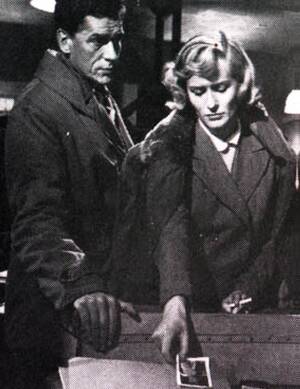 The film does take
The film does take 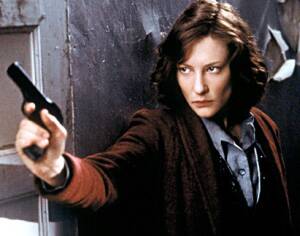 Love story or wartime thriller? The script here tries to have it both ways, and as a result of this uncertainty, the undeniable potential in the idea is unfulfilled. Gray (Blanchett) is dropped into Vichy France during World War II as an agent, but her bosses don’t realise she is more interested in finding her pilot lover (Penry-Jones), who’s been shot down nearby. While conflict between love, and love of country, would have been interesting, the former is almost ignored, then disposed of in a thoroughly unconvincing manner. Not that this diversion is uninteresting; you get a real sense of the terrors of war, with people being “vanished” in seconds, and the tension of living your life on a knife-edge behind enemy lines.
Love story or wartime thriller? The script here tries to have it both ways, and as a result of this uncertainty, the undeniable potential in the idea is unfulfilled. Gray (Blanchett) is dropped into Vichy France during World War II as an agent, but her bosses don’t realise she is more interested in finding her pilot lover (Penry-Jones), who’s been shot down nearby. While conflict between love, and love of country, would have been interesting, the former is almost ignored, then disposed of in a thoroughly unconvincing manner. Not that this diversion is uninteresting; you get a real sense of the terrors of war, with people being “vanished” in seconds, and the tension of living your life on a knife-edge behind enemy lines.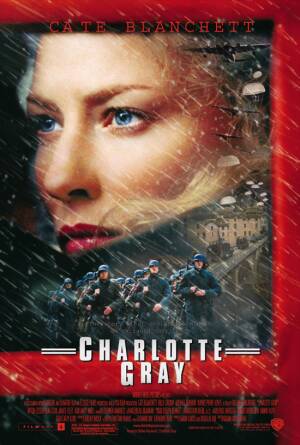 Mostly, the film is concerned with Charlotte’s protection of two Jewish children, and involvement in a resistance cell led by Julien (Crudup). They’re communists, so the British don’t really like them, but they’re convenient – and can be abandoned when necessary, the revelation of which provides the film with its most chilling moment. Blanchett has the right steely resolve for the role, and the cast is generally excellent; particular credit to Gambon (magnificently surly as Julien’s father), Ron Cook as Gray’s contact, and Anton Lesser, an oily collaborator who had us screaming “Die! Die!” at the TV set.
Mostly, the film is concerned with Charlotte’s protection of two Jewish children, and involvement in a resistance cell led by Julien (Crudup). They’re communists, so the British don’t really like them, but they’re convenient – and can be abandoned when necessary, the revelation of which provides the film with its most chilling moment. Blanchett has the right steely resolve for the role, and the cast is generally excellent; particular credit to Gambon (magnificently surly as Julien’s father), Ron Cook as Gray’s contact, and Anton Lesser, an oily collaborator who had us screaming “Die! Die!” at the TV set.
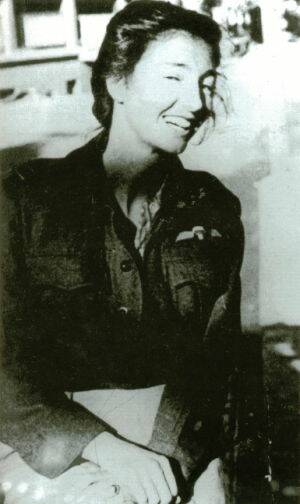 In World War II, the British SOE (Special Operations Executive) recruited and trained a number of women agents for insertion into occupied territory. There, they risked torture and execution, while carrying out missions of intelligence-gathering, subversion and sabotage. The exploits of some have received the recognition they deserve (such as Violette Szabo, who received both Britain’s George Cross and the French Croix de Guerre), but most seem to have slid through the cracks of time – Binney’s book is a solid and commendable effort to save at least a few from historical oblivion.
In World War II, the British SOE (Special Operations Executive) recruited and trained a number of women agents for insertion into occupied territory. There, they risked torture and execution, while carrying out missions of intelligence-gathering, subversion and sabotage. The exploits of some have received the recognition they deserve (such as Violette Szabo, who received both Britain’s George Cross and the French Croix de Guerre), but most seem to have slid through the cracks of time – Binney’s book is a solid and commendable effort to save at least a few from historical oblivion.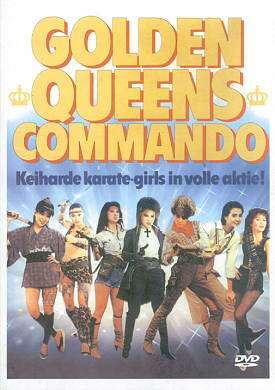 I’m going with the title on the print – your opinion may differ. As it likely will for this insane distillation of The Magnificent Seven and The Dirty Dozen, complete with music lifted from both Western and War genres. It certainly isn’t dull: incoherent and dumb, maybe, but you expect that in an early work from the director of Flying Dagger, one of the maddest Asian movies
I’m going with the title on the print – your opinion may differ. As it likely will for this insane distillation of The Magnificent Seven and The Dirty Dozen, complete with music lifted from both Western and War genres. It certainly isn’t dull: incoherent and dumb, maybe, but you expect that in an early work from the director of Flying Dagger, one of the maddest Asian movies